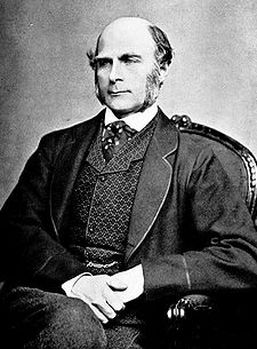Nature vs Nurture
What determines the personality or character of a person: nature or nurture?
This controversial debate has existed since 1869, when the phrase "Nature Versus Nurture" was coined by the English polymath, Francis Galton. Those who agree with the nature side argue that the DNA and genotype that we are born with determine who we are and what personality and traits we will have. On the other hand, those who agree with the nurture side of the debate argue that we are born with our minds as a 'blank state'. Through learning experiences and interactions with the world around us, we begin to gain an understanding of life and acquire different attributes.
Some people believe in both sides of the argument, saying that although we can learn and acquire traits from our surroundings, we are also born with unique abilities. When psychologist Donald Hebb was asked which contributes more to personality, nature or nurture, he answered, "Which contributes more to the area of a rectangle, its length or its width?"
Throughout different time periods, this controversy continued with two contrasting scientists leading the debate. During the Greek Classical period, Plato, who favored nature, disputed with Aristotle, who favored Nurture. Similarly, Emanuel Kant and John Locke, during the Enlightenment period, held the same debate. Nature vs Nurture developed among Ancient psychologists because of their interest in how individuals obtained their knowledge. Modern psychologists, however, are more concerned with factors such as intelligence, personality, and mental illness.
This controversial debate has existed since 1869, when the phrase "Nature Versus Nurture" was coined by the English polymath, Francis Galton. Those who agree with the nature side argue that the DNA and genotype that we are born with determine who we are and what personality and traits we will have. On the other hand, those who agree with the nurture side of the debate argue that we are born with our minds as a 'blank state'. Through learning experiences and interactions with the world around us, we begin to gain an understanding of life and acquire different attributes.
Some people believe in both sides of the argument, saying that although we can learn and acquire traits from our surroundings, we are also born with unique abilities. When psychologist Donald Hebb was asked which contributes more to personality, nature or nurture, he answered, "Which contributes more to the area of a rectangle, its length or its width?"
Throughout different time periods, this controversy continued with two contrasting scientists leading the debate. During the Greek Classical period, Plato, who favored nature, disputed with Aristotle, who favored Nurture. Similarly, Emanuel Kant and John Locke, during the Enlightenment period, held the same debate. Nature vs Nurture developed among Ancient psychologists because of their interest in how individuals obtained their knowledge. Modern psychologists, however, are more concerned with factors such as intelligence, personality, and mental illness.
Francis Galton:
An anthropologist, eugenicist, tropical explorer, geographer, inventor, meteorologist, proto-geneticist, psychometrician, and statistician, Francis Galton contributed to many areas of science, mathematics, and the English language. Galton founded the science of eugenics, or race improvement. Intrigued by his cousin, Charles Darwin's publication of On The Origin of Species (1859), Galton began to research further into the nature versus nurture debate. In his two publication, Hereditary Genius (1869) and English Men of Science: Their Nature and Nurture (1874), Galton explored the world of inheritance and evolution of traits. He believed that intelligence was largely inherited, favoring nature over nurture in that aspect of the debate. His work, Natural Inheritance (1889), shows the influence of former generations in the hereditary of individuals. His research shows that parents each contribute one-quarter to heredity of their children, grandparents each one-sixteenth, and so on. Although this favors nature over nurture as well, he also believed that evolution assured the survival of the best physical and mental traits.
An anthropologist, eugenicist, tropical explorer, geographer, inventor, meteorologist, proto-geneticist, psychometrician, and statistician, Francis Galton contributed to many areas of science, mathematics, and the English language. Galton founded the science of eugenics, or race improvement. Intrigued by his cousin, Charles Darwin's publication of On The Origin of Species (1859), Galton began to research further into the nature versus nurture debate. In his two publication, Hereditary Genius (1869) and English Men of Science: Their Nature and Nurture (1874), Galton explored the world of inheritance and evolution of traits. He believed that intelligence was largely inherited, favoring nature over nurture in that aspect of the debate. His work, Natural Inheritance (1889), shows the influence of former generations in the hereditary of individuals. His research shows that parents each contribute one-quarter to heredity of their children, grandparents each one-sixteenth, and so on. Although this favors nature over nurture as well, he also believed that evolution assured the survival of the best physical and mental traits.
Nature: DNA and genotype determine who we are (heredity):
Comparing a parent to their child, it is evident that physical characteristics come from specific genes. The nature theory, however, emphasizes that personality and character traits are determined by heredity as well. Recently, scientists have focused on aspects of intelligence, aggression, and sexual orientation that may be also encoded in an individual's DNA. Some parents may think that any bad trait that their child has is a direct result of bad parenting. The Nature Theory suggests that it is actually because of biological genes that were predetermined at birth. Plato, a classical Greek philosopher and mathematician, believed that knowledge was inborn in humans. Emmanuel Kant, a Prussian professor during the 18th Century Enlightenment period, believed that before the mind can make sense of its experiences, there needs to be an initial structure in the mind that enabled it to give meaning to that experience. Galton concluded that intelligence was inherited when he saw in his studies that achievement tend to run in families.
Comparing a parent to their child, it is evident that physical characteristics come from specific genes. The nature theory, however, emphasizes that personality and character traits are determined by heredity as well. Recently, scientists have focused on aspects of intelligence, aggression, and sexual orientation that may be also encoded in an individual's DNA. Some parents may think that any bad trait that their child has is a direct result of bad parenting. The Nature Theory suggests that it is actually because of biological genes that were predetermined at birth. Plato, a classical Greek philosopher and mathematician, believed that knowledge was inborn in humans. Emmanuel Kant, a Prussian professor during the 18th Century Enlightenment period, believed that before the mind can make sense of its experiences, there needs to be an initial structure in the mind that enabled it to give meaning to that experience. Galton concluded that intelligence was inherited when he saw in his studies that achievement tend to run in families.
Nurture: the notion of the mind as a ‘blank slate’:
John Locke, an English philosopher and physician, was the first to define the self through a continuity of consciousness. He founded the theory that the mind was a blank slate, or tabula rasa. Individuals are born without built-in knowledge, contrary to Plato´s beliefs. One learns through experience, parental guidance, and perception. William Golding's novel, Lord of the Flies, was written in hope of convincing readers that humans are born with an innate evil. It is the job of humans to contain that evil, similar to what Locke and Rousseau believed. Behaviorism shows the environment’s influence on individuals and their behavior. John Watson, an American psychologist believed that if he were given infants, then he could make one a doctor, another a thief, another a painter, and so on. All that would need to be done to accomplish this would be to control and manipulate the environment in which an individual developed. Hereditary factors are irrelevant to the development of an individual. You may think that the nurture we are referring to begins after birth, however the nature-nurture dynamic begins at the time of conception. The food that the mother eats, the air she breathes, the stress or trauma she experiences - all may affect her child.
John Locke, an English philosopher and physician, was the first to define the self through a continuity of consciousness. He founded the theory that the mind was a blank slate, or tabula rasa. Individuals are born without built-in knowledge, contrary to Plato´s beliefs. One learns through experience, parental guidance, and perception. William Golding's novel, Lord of the Flies, was written in hope of convincing readers that humans are born with an innate evil. It is the job of humans to contain that evil, similar to what Locke and Rousseau believed. Behaviorism shows the environment’s influence on individuals and their behavior. John Watson, an American psychologist believed that if he were given infants, then he could make one a doctor, another a thief, another a painter, and so on. All that would need to be done to accomplish this would be to control and manipulate the environment in which an individual developed. Hereditary factors are irrelevant to the development of an individual. You may think that the nurture we are referring to begins after birth, however the nature-nurture dynamic begins at the time of conception. The food that the mother eats, the air she breathes, the stress or trauma she experiences - all may affect her child.
Sources:
- http://www.interweb.in/attachments/pc-wallpapers/16215d1222951905-nature-photos-wallpapers-images-beautiful-pictures-nature-444-photos.jpg
- http://www.alexanderinteractive.com/blog/uploaded_images/nurture375_7i59.jpg
- http://images.wikia.com/psychology/images/e/ec/Francis_Galton_1850s.jpg
- "Nature vs. Nurture, as Seen by Economists." Economix: Explaining the Science of Everyday Life 16 Apr. 2011. General OneFile. Web. 23 Apr. 2011



